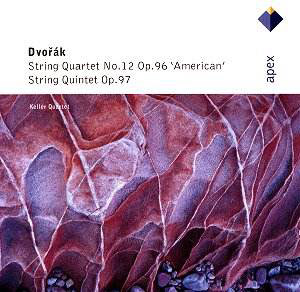These are recordings of
two of the works Dvořák composed on his visits to the USA. He’d
gone there to help set up the National Conservatory of Music in New
York, and to act as its first Director. Programme-note writers often
comment (as does the author of the booklet of this disc) that Dvořák
deliberately used elements of American folk-music, without explaining
how this is actually manifested in the music. In fact, Dvořák composed
these two works while staying at
a Czech community at Spillville, and was immersed in Czech music and
culture while he was there. Both pieces show the melodic and rhythmic
characteristics of Bohemian music which Dvořák developed in his
works all through his life, together with an unmistakable vein
of nostalgia, understandable in one so far from home.
The quartet (which used to be known as the Nigger,
and more recently has been re-christened with the PC title it now bears)
is the more straightforward and extrovert of the two works. The first
movement is given a fine, vigorous and idiomatic performance by the
Keller Quartet, while the melancholy melody of the slow movement is
projected lovingly. The cheerful scherzo and infectiously playful finale
are equally convincing. This is an enjoyable and extremely stylish interpretation.
The Quintet is a more complex, equivocal work. The
extra instrument is a second viola, which provides the composer with
the opportunity for gloriously rich textures. Again, the Kellers, with
Anna Deeva the guest viola, give a wonderfully
idiomatic performance, full of rhythmic ‘lift’ and sharply defined contours.
The first movement’s climaxes are built with passion, while the Scherzo
that follows, one of Dvořák’s most delightful, has a real rhythmic
bite to it. And the viola playing
in the Trio is a treat for the ears – fantastic phrasing, and so good
to hear Dvořák writing this great melody for the instrument he
loved to play himself.
The third movement begins with a quiet melody played
by just the two violas and the ‘cello, and gradually expands from there
into a set of free variations. This performance captures the music’s
quiet dignity and sense of space so very well, and the eventful finale
concludes with a splendidly convincing climax.
This is a most rewarding disc; the quartet plays superbly,
with great conviction and sense of style, and their unanimity of purpose
is never in doubt. The recording is highly acceptable – quite close,
but always preserving the overall picture.
Gwyn Parry-Jones


![]() See
what else is on offer
See
what else is on offer 